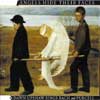Angels Hide Their Faces
View record and artist detailsRecord and Artist Details
Composer or Director: Henry Purcell, Johann Sebastian Bach
Label: Nonesuch
Magazine Review Date: 7/2001
Media Format: CD or Download
Media Runtime: 55
Mastering:
DDD
Catalogue Number: 7559 79605-2

Tracks:
| Composition | Artist Credit |
|---|---|
| Cantata No. 199, 'Mein Herze schwimmt im Blut' |
Johann Sebastian Bach, Composer
Arthur Haas, Organ Dawn Upshaw, Soprano Johann Sebastian Bach, Composer John Feeney, Double bass Krista Bennion Feeney, Violin Linda Quan, Violin Lois Martin, Viola Myron Lutzke, Cello Peggy Pearson, Oboe |
| Oedipus, Movement: Music for a while (song) |
Henry Purcell, Composer
Arthur Haas, Harpsichord Dawn Upshaw, Soprano Henry Purcell, Composer Myron Lutzke, Cello |
| (The) Indian Queen, Movement: I attempt from love's sickness |
Henry Purcell, Composer
Arthur Haas, Harpsichord Dawn Upshaw, Soprano Henry Purcell, Composer Myron Lutzke, Cello |
| Tyrannic Love, Movement: Ah! how sweet it is to love (song) |
Henry Purcell, Composer
Arthur Haas, Harpsichord Dawn Upshaw, Soprano Henry Purcell, Composer Myron Lutzke, Cello |
| Lord, what is man? |
Henry Purcell, Composer
Arthur Haas, Organ Dawn Upshaw, Soprano Henry Purcell, Composer Myron Lutzke, Cello |
| (The) Fairy Queen, Movement: Hark! now all things |
Henry Purcell, Composer
Arthur Haas, Harpsichord Dawn Upshaw, Soprano Henry Purcell, Composer Myron Lutzke, Cello |
| If music be the food of love |
Henry Purcell, Composer
Arthur Haas, Harpsichord Dawn Upshaw, Soprano Henry Purcell, Composer Myron Lutzke, Cello |
| (The) Blessed Virgin's Expostulation, 'Tell me, so |
Henry Purcell, Composer
Arthur Haas, Organ Dawn Upshaw, Soprano Henry Purcell, Composer Myron Lutzke, Cello |
| (An) Evening Hymn on a Ground, 'Now that the sun hath veil'd his light' |
Henry Purcell, Composer
Arthur Haas, Organ Dawn Upshaw, Soprano Henry Purcell, Composer Myron Lutzke, Cello |
Author:
Definitely a stimulant: a programme with something to say, and performances that are eager to say it. Affinities between Purcell and Bach present themselves in a mildly speculative way as the possible subject of a rather formal, rather dull, thesis. Here it is as though the two composers are found visiting the same art gallery or worshipping in the same church. Bach’s penitential cantata and Purcell’s scriptural monologues share a pained religious ecstasy, where a passion of spiritual musing finds its expression in long, twisting lines of music, with grievous lurches of harmony and chromatic disquiet. In Mein Herze schwimmt im Blut the major-key resolution, together with a reassuring tempo, strikes depths as does (say) the serenity of Purcell’s Evening Hymn after we have followed him through the tortuous developments of The Blessed Virgin’s Expostulation. The dance of joy in Bach’s last movement (‘Wie freudig ist mein Herz’) is matched in effect by the placing of Hark! now all things in one sound rejoice after the searching earnestness of Lord, what is man?
The programme itself is presented with real conviction by the singer and instrumentalists. The quality of recorded sound also plays its part, for the performers are heard as a group, with attention focused upon the voice at the right time but with the players (again in the right passages) providing much more than ‘accompaniment’. Dawn Upshaw sees everything as experience and every experience as something to share. She sees those snakes dropping one by one (‘drop, drop, drop’) in Music for a while. In Lord, what is man? the questions are real and urgent. In the Expostulation the anxieties of the Holy Mother are painfully human. In the Bach cantata we seem to see as well as hear; and perhaps that is what comes from staging the work, as Upshaw has done with the producer Peter Sellars. Certainly everything here lives as a present unfolding reality rather than as a reproduction of notes on paper.
Tempos are brisk, words clear, rhythms well pointed. The voice is clear and secure, the instrumental work skilful and alert. 55 minutes is not over-generous as playing-time, but the programme is so satisfyingly balanced I wouldn’t want it changed
The programme itself is presented with real conviction by the singer and instrumentalists. The quality of recorded sound also plays its part, for the performers are heard as a group, with attention focused upon the voice at the right time but with the players (again in the right passages) providing much more than ‘accompaniment’. Dawn Upshaw sees everything as experience and every experience as something to share. She sees those snakes dropping one by one (‘drop, drop, drop’) in Music for a while. In Lord, what is man? the questions are real and urgent. In the Expostulation the anxieties of the Holy Mother are painfully human. In the Bach cantata we seem to see as well as hear; and perhaps that is what comes from staging the work, as Upshaw has done with the producer Peter Sellars. Certainly everything here lives as a present unfolding reality rather than as a reproduction of notes on paper.
Tempos are brisk, words clear, rhythms well pointed. The voice is clear and secure, the instrumental work skilful and alert. 55 minutes is not over-generous as playing-time, but the programme is so satisfyingly balanced I wouldn’t want it changed
Discover the world's largest classical music catalogue with Presto Music.

Gramophone Digital Club
- Digital Edition
- Digital Archive
- Reviews Database
- Full website access
From £8.75 / month
Subscribe
Gramophone Full Club
- Print Edition
- Digital Edition
- Digital Archive
- Reviews Database
- Full website access
From £11.00 / month
Subscribe
If you are a library, university or other organisation that would be interested in an institutional subscription to Gramophone please click here for further information.




